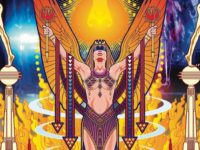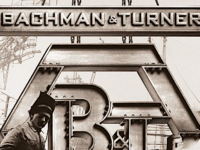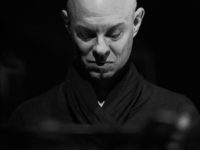Nik Turner, the sax-playing space-rock pioneer with Hawkwind, may be as busy as he’s ever been.
Fresh off a carnival-like series of appearances at South by Southwest, Turner’s working on a new album, and will make several guest appearances on albums by the Prog Collective and William Shatner. Meanwhile, he’s also the subject of a new biopic — the reason for that recent visit to the U.S.
Beginning in 1969, Turner helped to craft Hawkwind’s way-out sound over their first six albums, then returned later in the 1980s, memorably guesting on Choose Your Masques. After a falling out with fellow co-founder Dave Brock, Turner would go on to form Sphynx, Inner City Unit, Nik Turner’s Fantastic All Stars and Outriders of the Apocalypse, as well as a series of Hawkwind-related groups like Hawkestra, Space Ritual and even x-Hawkwind — though Brock eventually stepped in there and claimed trademark infringement.
That certainly didn’t slow him down. Turner’s new album, his first solo venture since 2001’s Kubanno Kickasso with the Fantastic All Stars, will be produced by Billy Sherwood for Cleopatra Records. They initially worked together on last year’s Fusion Syndicate, and Turner will appear on a pair of other forthcoming Sherwood-helmed projects, including The Prog Collective 2 as well as Shatner’s new solo album. Turner guested on Nektar’s last album and also appeared recently with the prog-metal group OHM, fronted by Chris Poland of Megadeth.
Turner joined us, in this exclusive Something Else! Sitdown, to talk about this flurry of new activity, his history with Hawkwind, an abiding passion for fusion, and why even today the offbeat saxist still busks for loose change …
NICK DERISO: How did you develop such an individualistic style on the saxophone?
NIK TURNER: I learned to play saxophone when I was about 17, and I didn’t play for a long time. Then I ran into a musician who told me that I didn’t have to be technical to express myself. I thought: “That sounds good. I could play free jazz in a rock band!” And that’s what Hawkwind was for me. I’d played in a big band, a soul band, a ska band, a punk band. I didn’t want to just be limited to playing jazz, or marching band music. I listened to lots of avant garde stuff. I found, when I was learning, that there was so much stuff that far beyond me, so I sort of became more interested in Jimi Hendrix, so I used to play with a wah-wah pedal and all sorts of effects on my saxophone. I’m very keen on Bitches Brew and Miles Davis here at the moment. I love Chick Corea, Wayne Shorter and those guys. I just like to have the influences of these people. I find it stimulating. I only listen to music that I can learn from.
NICK DERISO: You certainly hear that complexity in the early music of Hawkwind, which boasted such a broad range of influences.
NIK TURNER: The musicians in the original band were very diverse, and from very diverse backgrounds. I was very interested in free jazz, the drummer was very primitive. Terry Ollis taught himself to play drums, so he had a very primitive style. (Vocalist and guitarist) Dave Brock was influenced by blues. He was a fan of Buster Bennett, and people like that. (Fellow guitarist) Mick Slattery was also a blues man. Dik Mik, the electronics guy, had never been in a band before. He was sort of thrown into it and, given audio generators, he started making all of these weird noises. To me, I think he was the sound of Hawkwind, really. Then, John Harrison, the (late original) bass player, his background was big band jazz. He had played with Joe Loss, a British band from the 1940s. That was the Hawkwind band, really. It then developed over a period of time. With Hawkwind, I always considered them the working-man’s version of the Pink Floyd. It was all psychedelic, with lots of strobe lights, and there were always drugs. It was a bit like the Grateful Dead, really, in that people used to come to the gigs, and have life-changing experiences.
NICK DERISO: Take us back to the beginnings of your first Hawkwind vocal, “Master of the Universe,” which today remains a concert favorite — and recently appeared in a commercial for Ford.
NIK TURNER: That song, when I arrived in the studio to record the album In Search of Space, (1971-72 era bassist) Dave Anderson had this riff — though Dave Brock ended up taking credit for it. Dave said: “Have you got any lyrics for it?,” and I thought about it. I had these lyrics, which I written as a poem, and they fit the riff. So I put the words to the song, and when we were recording it, I asked: “Who’s going to sing it?” Everybody said, “Well, you.” I said: “Well, I’m not a singer. I don’t sing.” They said: “Here’s the microphone,” so that was my introduction to singing, really.
NICK DERISO: What was your reaction to the sudden loss of Huw Lloyd-Langdon, who served an early stint with you in Hawkwind?
NIK TURNER: I thought it was very sad. That was completely unexpected to me. I had always been friends with him, since he joined the band in 1969. Mick Slattery was the original guitarist in Hawkwind, but he didn’t really like the commercial aspects. He didn’t like to be working regularly, though I work with him now in my band Space Ritual. But Huw was a very highly strung lad. He was actually a vegan, at the time. I think he inadvertently took some LSD, maybe at the Isle of Wight festival — I’m not sure — and he had a bad trip. Very unfortunately, he had what they used to call “the horrors.” It was very sad. At the Isle of Wight festival, you couldn’t drink anything that didn’t have LSD in it. So, Huw had some, and it’s very difficult when everybody is tripping to actually help people. One is sort of not that practically minded. I took some antidote to gigs for people who were having a bad trip, something called vitamin B-12, which was supposed to bring people down quickly. I just thought it was a terrible thing. I never really was one to take LSD, except when people gave it to me when I didn’t know I was taking it. At the Isle of Wight festival, we were playing in this inflatable tent, a big dome. At one point, the power went off, and the dome started collapsing — and Huw thought he was in hell. It was very traumatic, a very frightening experience for him. I think as a result, he found God. Thereafter, I played with him quite a lot on different occasions, in different bands and different versions of Hawkwind. I always thought he was a very nice lad, and a very good guitarist — and a very interested, gifted songwriter. It was quite a shock to hear that he had died. Terribly sad. May he rest in peace.
NICK DERISO: My understanding was that you originally were going to call your new touring group x-Hawkwind, before Dave Brock stepped in.
NIK TURNER: It was called that until I had certain legal problems. Unfortunately, he trademarked the name, and he claimed I was trying to pass myself off as Hawkwind. That ended up in a legal battle, which I didn’t really need, actually. He said I couldn’t use the name, as such.
NICK DERISO: It’s a bit ironic that this has happened, being as how legend tells us that you were the inspiration for the Hawkwind monicker.
NIK TURNER: It was laughingly referring to my predilection toward hawking or spitting, and then sort of breaking wind. (Laughs.) It was all just a laugh, really.
NICK DERISO: You’ve remained active, in the post-Hawkwind years — working with a variety of groups, many of them with a mythical theme.
NIK TURNER: What I do, is I play in two or three bands in Britain. One of them is called the Space Ritual, which is all ex-members of Hawkwind, and we play a bit of Hawkwind material — though we also play a lot of new material, much of which I have written based on my interest in mythology. I’ve been very interested in all sorts of mythology all my life. I grew up having both of my parents through mythological books at me, and I’ve been to Greece and Italy and spent some time in Egypt. In fact, I recorded an album of music inside the Great Pyramid. Then I put together a band called Outriders of the Apocalypse, which is all about Mayan mythology. The music was based on Spanish classical music, and presented like Miles Davis’ Bitches Brew. It was very exciting. I find mythology very interesting, and I try to connect it with science fiction. It’s food for my imagination.
NICK DERISO: Much of your most recent musical activity has grown out of your relationship with Billy Sherwood. How did you meet?
NIK TURNER: I was involved with Cleopatra, back in the 1990s. I did a couple of tours around America, and I had a few albums out with them at that time. Then, out of the blue, I suddenly had a communication from them asking if I wanted to do some recording on the Syndicate album. I was very excited by that. Billy sent me a .wav file, and I went into the studio and recorded some tracks on it, and at the same time I was doing something with Nektar — which Billy was also working on. I came to America to make a film, actually, a biographical film. While I was here, I suddenly found myself doing other recordings. I did another track with Billy for Fusion Syndicate 2, and another track for William Shatner’s album — which Billy is producing. Then I started work on a solo album, featuring Billy Cobham, amongst lots of other really well-known people. Some of it is based around Chris Poland, the guitarist with Megadeth — now playing with a band called OHM.
NICK DERISO: Speaking of the film, I heard a crew followed you to the South by Southwest Festival. That must have been quite a scene.
NIK TURNER: It was very exciting. I was busking on the street in Austin, walking along and playing my saxophone — with my face painted silver. (Cleopatra Records head) Brian (Perera) seemed to have this obsession about my having had a song dedicated to me by Jimi Hendrix, at the Isle of Wight Festival in 1970. I was the “cat with the silver face” that Jimi dedicated the song to, “Foxy Lady.” Brian sort of liked that image. So when I was at the South by Southwest Festival, I painted my face silver. (Laughs.) While I was walking down the street, I found this punk-metal band playing, and I just joined in with them. Then I found a Latin big band, with lots of brass that were playing the Duke Ellington song “Caravan,” and I just jumped in with them, as well. I was just putting myself around a bit. It was all filmed, and it was all going toward the composition of this biographical film about me.
NICK DERISO: Surely, you must get some strange reactions, when people realize this guy playing on the street is Nik Turner from Hawkwind.
NIK TURNER: People will say: “Nik Turner, what are you doing here?” I say: “Well, I’m taking the music to the people, and maybe making a buck.” People will tell me how much Hawkwind meant to them. That happens all of the time. I think the band was a life-changing experience. It must have been quite phenomenal for people. There was nothing else like it around. It almost like you couldn’t have conjured something like that up. But I’m so used to playing in lots of different contexts. I used to go busking a lot, near to where I live on a Saturday night. It was really cool.
- Nick DeRiso’s Best of 2015 (Rock + Pop): Death Cab for Cutie, Joe Jackson, Toto + Others - January 18, 2016
- Nick DeRiso’s Best of 2015 (Blues, Jazz + R&B): Boz Scaggs, Gavin Harrison, Alabama Shakes - January 10, 2016
- Nick DeRiso’s Best of 2015 (Reissues + Live): John Oates, Led Zeppelin, Yes, Faces + others - January 7, 2016




